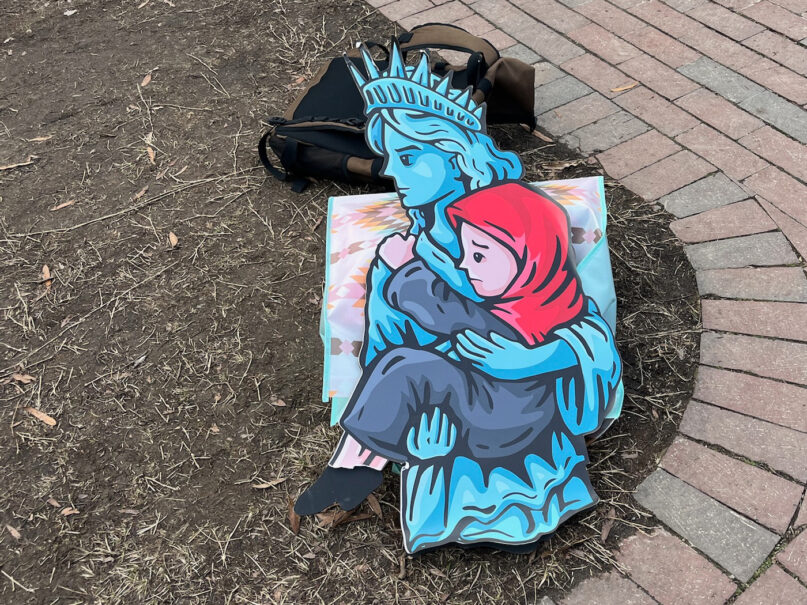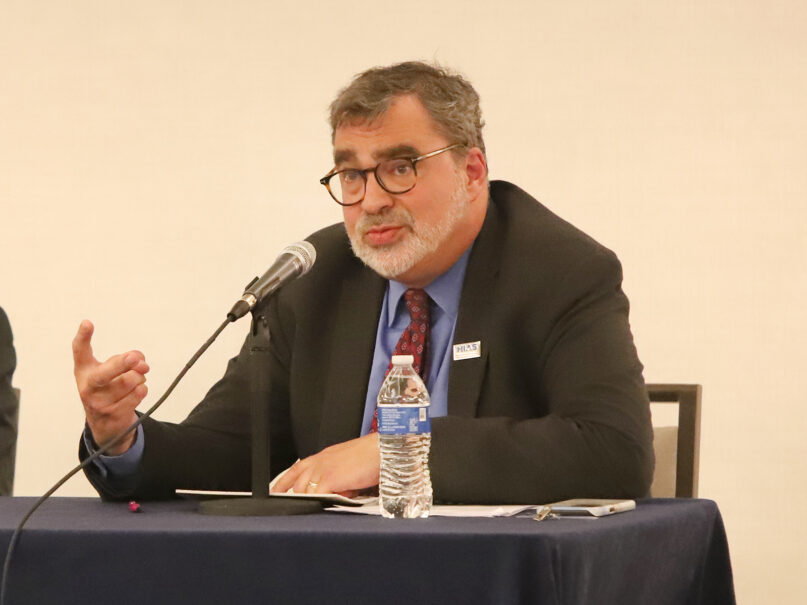(RNS) — Ahead of a formal opinion, a federal appeals court temporarily ruled Friday (Sept. 12) that the Trump administration can suspend refugee admissions, staying previous legal decisions that had required the administration to admit some refugees who already had travel plans to the U.S. before the suspension was announced.
The U.S. Court of Appeals for the 9th Circuit also ruled that the administration cannot stop providing services to refugees after they arrive in the U.S.
The stay is the latest development in Pacito v. Trump, a lawsuit brought by Church World Service, HIAS, Lutheran Community Services Northwest and individual refugee families. The case challenges both the Trump administration’s suspension of refugee admissions and its funding freeze for refugee resettlement agencies.
The decision received a mixed reaction from the plaintiffs.
Mark Hetfield, president and CEO of HIAS, a Jewish organization that works with refugees, told RNS the decision leaves “thousands of DHS vetted and approved refugees stranded, their pathway to safety taken away from them.” He added, “On the other hand, we welcome the 9th Circuit’s finding against President (Donald) Trump’s attempt to shut down resettlement services to recently arrived refugees.”

Danilo Zak. (Photo courtesy of Church World Service)
Linda Evarts, senior supervising attorney at the International Refugee Assistance Project, the group representing the plaintiffs, said the appeals court order “makes clear that it was against the law for the State Department to withhold vital benefits Congress provided for refugees to help them settle into their new lives in the U.S.”
Danilo Zak, director of policy at Church World Service, called “the requirement for the administration to reinstate cooperative agreements and serve thousands of those who have already arrived,” including many Afghan Special Immigrant Visa holders, “a major victory.”
The Trump administration has said 12,000 refugees had already been vetted and had their tickets booked when it suspended refugee admissions on Jan. 20. The administration has also confirmed that before the suspension, more than 128,000 people had been conditionally approved for refugee status.
Evarts emphasized that those refugees “remain in limbo, fleeing danger and separated from their families.”
“Every day that the refugee ban remains in place, their lives hang in the balance,” she said.
Zak said refugees who already had their tickets booked, unaccompanied refugee minors and refugees with “particular medical challenges” all “remain stranded, while Afrikaners continue to be fast-tracked ahead of them and instead of them.”
The Trump administration has focused on Afrikaners, the white South African minority who once ran the country’s apartheid system, as refugees because of claims they are being violently persecuted, despite police statistics showing Afrikaners are not disproportionately likely to be victims of crime.
Over a monthslong legal battle, the Trump administration, plaintiffs and courts went back and forth about which refugees the administration was required to admit, with the 9th Circuit progressively narrowing the group of refugees the administration was required to admit.

A depiction of a refugee being held by Lady Liberty during a protest in Washington, D.C., Feb. 4, 2025. (RNS photo/Aleja Hertzler-McCain)
Under injunctions put in place by U.S. District Judge Jamal Whitehead, an appointee of President Joe Biden, over 70 refugees, including two individual plaintiffs, were able to resettle in the U.S., according to their lawyers.
Now, the appeals court has decided in a majority opinion by President George W. Bush appointees Judge Richard Clifton and Judge Jay Bybee that the Trump administration is likely to prevail in suspending the refugee program because of the “broad discretion” of the president, allowing him to block further resettlement.
Trump appointee Judge Kenneth Kiyul Lee agreed with that determination but dissented from the other judges’ ruling that the Trump administration would likely lose to plaintiffs in their attempt to defund refugee services after refugees arrive in the U.S. The majority argued Congress makes that funding mandatory, while Lee said those programs are also subject to executive discretion.
In February, the Trump administration sent out termination notices of grant agreements to the 10 refugee resettlement organizations that were operating in the U.S. Seven of those organizations are faith-based. Those notices came just one day after Whitehead had issued a preliminary injunction that should have restarted the refugee admissions program.
Since then, the Catholic bishops’ conference and the Episcopal Church have ended their contracts with the federal government.
On March 10, the Trump administration told the district court that it was “actively preparing a request for proposals for a new resettlement agency that could provide reception and placement services,” but Friday’s appeals court ruling notes that the Trump administration had said during oral argument that it “was unaware whether any progress had been made toward securing a new agency or agencies that could provide reception and placement services.”

Mark Hetfield discusses the U.S. Refugee Admissions Program during a panel at the Religion News Association conference, April 3, 2025, in Arlington, Va. (RNS photo/Kit Doyle)
Hetfield and the plaintiff’s lawyers expressed resolve to continue fighting for refugees. Hetfield told RNS, “As the Jewish community’s refugee agency, we will continue to fight for their right to safely resettle in the United States.”
Similarly, Zak said, “We will keep fighting for stranded refugees and their right to resettle in the United States.”
Evarts echoed those sentiments: “We will continue our fight to welcome people fleeing persecution to this country, just as Congress intended with the Refugee Act, and to recognize the immense contributions refugees make to our communities.”







